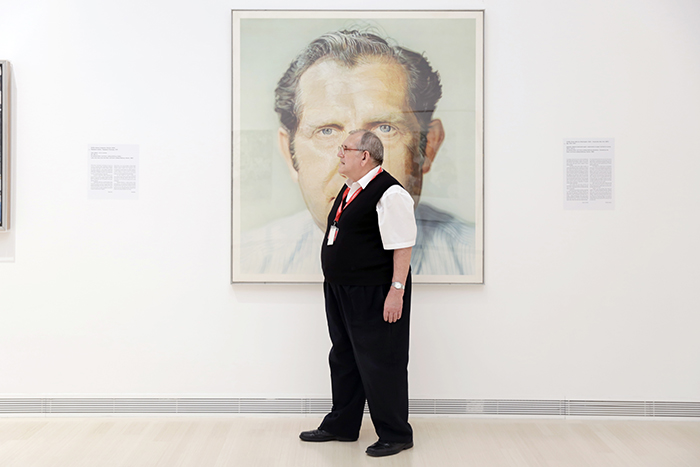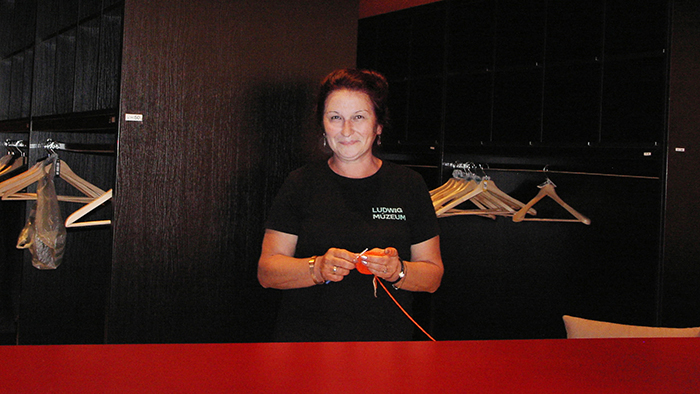HANDLE WITH CARE, 15. SEPTEMBER, 2023 – 14. JANUARY, 2024
Caring is a common experience for all of us, and it shapes our lives from the moment of birth until death. It can be interpreted on the personal level (self-care) or projected onto relationships between people (maternal or parental care, elderly care), but can also be extended to caring for nonhumans and, in a broader sense, for the Earth itself. The multifaceted concept of care also has strong economic and political dimensions: care crisis, care migration, global care chains and their impact are among the most pressing issues of our time.

The exhibition’s title Handle with Care refers to the vulnerability of those in need of care, the asymmetrical relationship between carer and cared for, the fragility of life and our ecosystem, and the cracks and gaps in the social care system, but most of all, it calls attention to the need for collective responsibility. Finally, it can also be applied to the role of the museum itself, which, beyond the careful management of artworks, faces new tasks and challenges that affect society. In a time of multiple crises – social, economic, ecological, health crisis – the exhibition seeks to answer the question of how to interpret the changing notion of care and the role of art (and the museum) in rethinking it. Bearing in mind the original meaning of the word curator (curare: to care, to nurture, to heal), what are the pillars of a ‘caring’ museum? How can an art institution become more sensitive to social issues, more inclusive, more open, more accessible, in short, a more relevant place?
Caring permeates almost every aspect of our social reality today. It is partly in the wake of pandemic COVID-19 that the that both collective and individual care, has been brought into sharper focus than ever before. The pandemic has shed a harsh light on the politics of care, has shown the heavy burden on women, on social workers and the inequality in the gender distribution of caring work. It has also highlighted issues relating to the role of governmental care, the primacy of economic interests and the autonomy of the individual.
This exhibition raises questions rather than providing ready answers to these problems. The different artistic positions take up different points of view and the diversity of the issues raised underlines the fact that care is a key concept of our time with a critical potential that cannot be neglected.
Download the EXHIBITION BOOKLET HERE.
Curators: Rita Dabi-Farkas, Viktória Popovics
Concept: Viktória Popovics
Exhibiting Artists:
BAGLYAS Erika, Maria BARTUSZOVÁ, Oksana BRIUKHOVETSKA, Elina BROTHERUS, Seba CALFUQUEO, Alexandr CHEKMENEV, Phil COLLINS, Anna DAUČÍKOVÁ, EPERJESI Ágnes, ESTERHÁZY Marcell, FAJGERNÉ DUDÁS Andrea, FÁTYOL Viola, Andreas FOGARASI, Coco FUSCO, Anna HULAČOVÁ, Sanja IVEKOVIĆ, KIS Judit, LŐRINCZ Réka, Kateryna LYSOVENKO, MATERNAL FANTASIES, OLÁH Norbert, Oláh Mara OMARA, Kateřina ŠEDÁ, SZÁSZ Lilla, SZENES Zsuzsa, TARR Hajnalka, TRANKER Kata, VÉKONY Dorottya, Stephanie WINTER
Contributors: ERDEI Krisztina, JÁSDI Juli, KÁLLAY Eszter, PÓCSIK Andrea és OLÁH Norbert, RomaMoMA Nomadic Library, Romani Design
